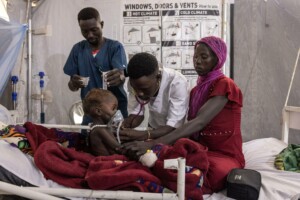Sortony rapid assessment: Lack of water sources, security
An inter-agency team led by OCHA and the Sudanese aid commission visited Sortony in North Darfur to assess the humanitarian needs, after the arrival of thousands of displaced people from villages in Jebel Marra.
An inter-agency team led by OCHA and the Sudanese aid commission visited Sortony in North Darfur to assess the humanitarian needs, after the arrival of thousands of displaced people from villages in Jebel Marra.
Because of the ongoing fighting between government and rebel forces in Jebel Marra and nearby areas, the displaced people fled their homes to seek refuge at the African Union/UN Hybrid operation in Darfur (Unamid) Team Site in Sortony, about 50 kilometres southeast from Kabkabiya town.
From 2 to 4 February, the inter-agency team of the Sudanese Humanitarian Aid Commission (HAC) and the United Nation's humanitarian office (OCHA) observed thousands of them lacking basic services including water, sanitation, health, and food.
Unamid estimated that some 22,000 displaced people were at the site. Community leaders put the figure as high as 37,000. These newly displaced people, of whom 90 per cent are women and children, have arrived from more than 59 villages, with more people on their way to Sortony, according to the Unamid and displaced people.
New head counting
The mission recommended an immediate head counting and adoption of the figures provided by Unamid (21,690 people), to improve addressing the humanitarian needs. The most urgent needs are, prioritised in this order by respondents: access to safe water and sanitation, non-food items (sheets, tents), food, healthcare and nutrition, education, and protection.
In the reporting period, the nearest water source for the displaced is in Kubi, 6-8 kilometres from the Unamid team site. The displaced population is dependent on an inadequate water supply through trucking by Unamid (which attempts to truck 40,000 liters daily) and aid organisations.
The distance of available water sources concerns the displaced. They worry about the insecurity in the area because of cattle theft perpetrated by armed groups coming from outside Sortony.
Tensions between the displaced community and armed herders in the area of Sortony have been escalating starting 2 May. Last week, following deadly attacks by armed locals from outside Sortony, the attackers established an intermittent blockade on the road from Kabkabiya, an essential route for the provision of water and humanitarian aid. A camp coordinator told Radio Dabanga that they prevented water tankers from reaching the site for several days.
Malnutrition
The assessment mission in February found that approximately 3,687 (17 per cent) of the displaced (21,690) are children between 6-59 months of age. The results of a randomly selected sample of 108 children screened for Mid-Upper Arm Circumference showed a 35 per cent Global Acute Malnutrition (GAM) which is more than the World Health Organization’s emergency threshold of 15 per cent.
Access, registration
OCHA explains that humanitarians were not allowed to have presence in Sortony for the last three years, however the State authorities have now committed to facilitate humanitarian access.
The UN's humanitarian office reported in its latest weekly bulletin that IOM’s registration and verification process in Sortony remains suspended by authorities since mid-February. Advocacy for the resumption of the verification process continues. Following a headcount exercise carried out in Sortony in March, WFP currently has 20,000 beneficiaries in Sortony receiving emergency food assistance.
The complete inter-agency assessment team's report











 and then
and then